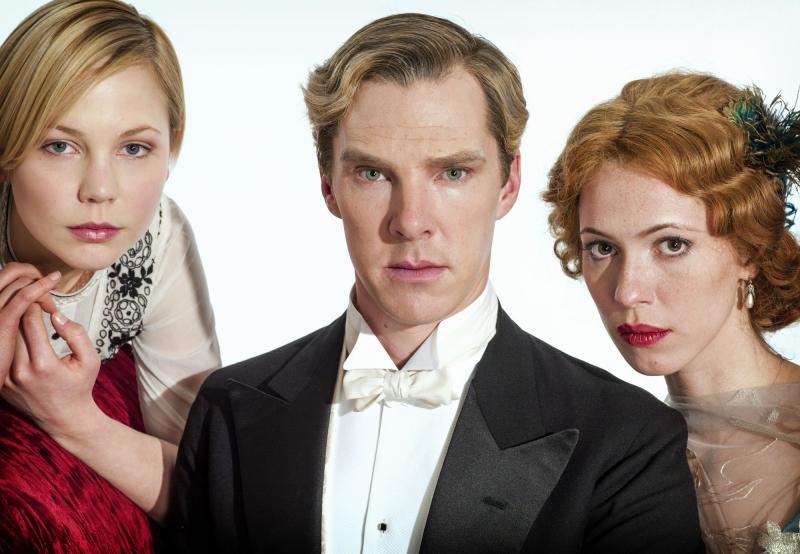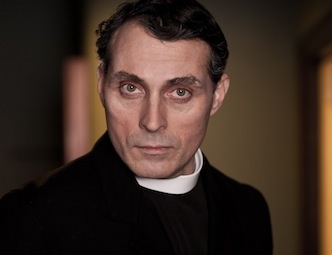Parade's End, BBC Two | reviews, news & interviews
Parade's End, BBC Two
Parade's End, BBC Two
An ambitious attempt to bring Ford Madox Ford's magnum opus to the small screen is not entirely successful

Television schedules seem not to matter much any more, since we can now watch on repeat more or less any time we choose. But it still seems strange that the BBC are airing their new five-part period drama, which is part-funded by the HBO network to the tune of £12 million, on a Friday evening in the middle of August – even though it’s turned out to be ideal weather for staying in.
In other words it reeks of serious quality drama, but one, since it’s set at the cusp of and during the First World War, that still has room for Downton Abbey comparisons. Win, win. There’s also a whiff of Birdsong in there, though any further nod in that direction would be pushing it, since the two authors occupy opposite literary hemispheres. Ford Madox Ford wasn’t the Sebastian Faulks of his day, though who can say whether anyone will be reading Faulks in 80 years' time?
Occasionally, Hall and Cumberbatch appear to be acting in different dramas
The till now neglected quartet of novels that make up Parade’s End are difficult, elusive, impressionistic. Ford wrote his tetralogy between 1924 and 1928 and the books look back upon an England that disappeared almost overnight with the coming of war. But neither the books nor the adaptation are interested in revisiting the myth of a pre-war golden age: firstly, we get a small sense of things already stirring afoot in old England, but, more importantly, it’s the exploration of an interior life that matters here. Events unfold through the eyes of its central character, and often events give way to unstructured, fragmentary thought-impressions. Ford doesn’t quite go as far as Joyce in disrupting linear narrative, but there are serious challenges for an adaptation.
Benedict Cumberbatch plays Christopher Tietjens, billed as “the last Tory” and “the cleverest man in England”. Indeed, there is something of the Sherlock Holmes in this brilliant government statistician, though here Cumberbatch adopts a deeper voice, and wears blond highlights and a fat suit. His forensic intelligence – put to use not in sleuthing but in making corrections in the margins of the Encyclopaedia Britannica – together with a clinical air of impenetrability, both intrigue and drive his faithless wife into a fury, so much so that she wishes to puncture her husband’s stiff moral rectitude by sexually tormenting him.
As the shallow, spoilt and self-absorbed wife whom Tietjens marries when she falls pregnant with a child which may or may not be his, Rebecca Hall appears somewhat miscast. Hall’s face and gestures flicker with a sensitive intelligence which she struggles to play against and which seem quite at odds with Sylvia Tietjens's monstrous character. Perhaps Hall might have swapped roles with Adelaide Clemens, who, as Valentine Wannop, is the young, in fact alarmingly young-looking, suffragette whom Tietjens falls for. Yet even Wannop’s impish, sparring feistiness goes strangely flat during her exchanges with Tietjens.
 There are problems, too, with an erratic tone, as we find we’ve occasionally veered into daft comedy. Rufus Sewell, as the mad, scatological Reverend Duchemin (pictured right), seems to have wandered in as a character extra from Cold Comfort Farm. And Sylvia’s foot-stamping, upper-class ennui plays against the grain not just of Hall’s instincts as an actor but of much of the writing and direction elsewhere. Occasionally, Hall and Cumberbatch appear to be acting in different dramas.
There are problems, too, with an erratic tone, as we find we’ve occasionally veered into daft comedy. Rufus Sewell, as the mad, scatological Reverend Duchemin (pictured right), seems to have wandered in as a character extra from Cold Comfort Farm. And Sylvia’s foot-stamping, upper-class ennui plays against the grain not just of Hall’s instincts as an actor but of much of the writing and direction elsewhere. Occasionally, Hall and Cumberbatch appear to be acting in different dramas.
Stoppard and Susanna White, who directs, have been valiantly ambitious in trying to tame Ford’s magnum opus for the screen, but unwelcome confusions remain. I watched the first episode twice and I’m not sure these were cleared on a second viewing. I shall, however, continue to watch with interest since, despite its flaws and whatever difficulties remain in capturing it, there's substance here.
Share this article
Add comment
The future of Arts Journalism
You can stop theartsdesk.com closing!
We urgently need financing to survive. Our fundraising drive has thus far raised £49,000 but we need to reach £100,000 or we will be forced to close. Please contribute here: https://gofund.me/c3f6033d
And if you can forward this information to anyone who might assist, we’d be grateful.

Subscribe to theartsdesk.com
Thank you for continuing to read our work on theartsdesk.com. For unlimited access to every article in its entirety, including our archive of more than 15,000 pieces, we're asking for £5 per month or £40 per year. We feel it's a very good deal, and hope you do too.
To take a subscription now simply click here.
And if you're looking for that extra gift for a friend or family member, why not treat them to a theartsdesk.com gift subscription?
more TV
 Mr Scorsese, Apple TV review - perfectly pitched documentary series with fascinating insights
Rebecca Miller musters a stellar roster of articulate talking heads for this thorough portrait
Mr Scorsese, Apple TV review - perfectly pitched documentary series with fascinating insights
Rebecca Miller musters a stellar roster of articulate talking heads for this thorough portrait
 Down Cemetery Road, Apple TV review - wit, grit and a twisty plot, plus Emma Thompson on top form
Mick Herron's female private investigator gets a stellar adaptation
Down Cemetery Road, Apple TV review - wit, grit and a twisty plot, plus Emma Thompson on top form
Mick Herron's female private investigator gets a stellar adaptation
 theartsdesk Q&A: director Stefano Sollima on the relevance of true crime story 'The Monster of Florence'
The director of hit TV series 'Gomorrah' examines another dark dimension of Italian culture
theartsdesk Q&A: director Stefano Sollima on the relevance of true crime story 'The Monster of Florence'
The director of hit TV series 'Gomorrah' examines another dark dimension of Italian culture
 The Monster of Florence, Netflix review - dramatisation of notorious Italian serial killer mystery
Director Stefano Sollima's four-parter makes gruelling viewing
The Monster of Florence, Netflix review - dramatisation of notorious Italian serial killer mystery
Director Stefano Sollima's four-parter makes gruelling viewing
 The Diplomat, Season 3, Netflix review - Ambassador Kate Wyler becomes America's Second Lady
Soapy transatlantic political drama keeps the Special Relationship alive
The Diplomat, Season 3, Netflix review - Ambassador Kate Wyler becomes America's Second Lady
Soapy transatlantic political drama keeps the Special Relationship alive
 The Perfect Neighbor, Netflix review - Florida found-footage documentary is a harrowing watch
Sundance winner chronicles a death that should have been prevented
The Perfect Neighbor, Netflix review - Florida found-footage documentary is a harrowing watch
Sundance winner chronicles a death that should have been prevented
 Murder Before Evensong, Acorn TV review - death comes to the picturesque village of Champton
The Rev Richard Coles's sleuthing cleric hits the screen
Murder Before Evensong, Acorn TV review - death comes to the picturesque village of Champton
The Rev Richard Coles's sleuthing cleric hits the screen
 Black Rabbit, Netflix review - grime and punishment in New York City
Jude Law and Jason Bateman tread the thin line between love and hate
Black Rabbit, Netflix review - grime and punishment in New York City
Jude Law and Jason Bateman tread the thin line between love and hate
 The Hack, ITV review - plodding anatomy of twin UK scandals
Jack Thorne's skill can't disguise the bagginess of his double-headed material
The Hack, ITV review - plodding anatomy of twin UK scandals
Jack Thorne's skill can't disguise the bagginess of his double-headed material
 Slow Horses, Series 5, Apple TV+ review - terror, trauma and impeccable comic timing
Jackson Lamb's band of MI5 misfits continues to fascinate and amuse
Slow Horses, Series 5, Apple TV+ review - terror, trauma and impeccable comic timing
Jackson Lamb's band of MI5 misfits continues to fascinate and amuse
 Coldwater, ITV1 review - horror and black comedy in the Highlands
Superb cast lights up David Ireland's cunning thriller
Coldwater, ITV1 review - horror and black comedy in the Highlands
Superb cast lights up David Ireland's cunning thriller
 Blu-ray: The Sweeney - Series One
Influential and entertaining 1970s police drama, handsomely restored
Blu-ray: The Sweeney - Series One
Influential and entertaining 1970s police drama, handsomely restored

Comments
I disagree with everything
I quite agree with Hall.
I agree about Rebecca Hall,
I think Rebecca Hall is
I found this episode of
Give me Downton any day
This is not an easy watch and
With the plotline so hard to
My husband and I were really
Almost impossible to follow,
This was turgid, soulless